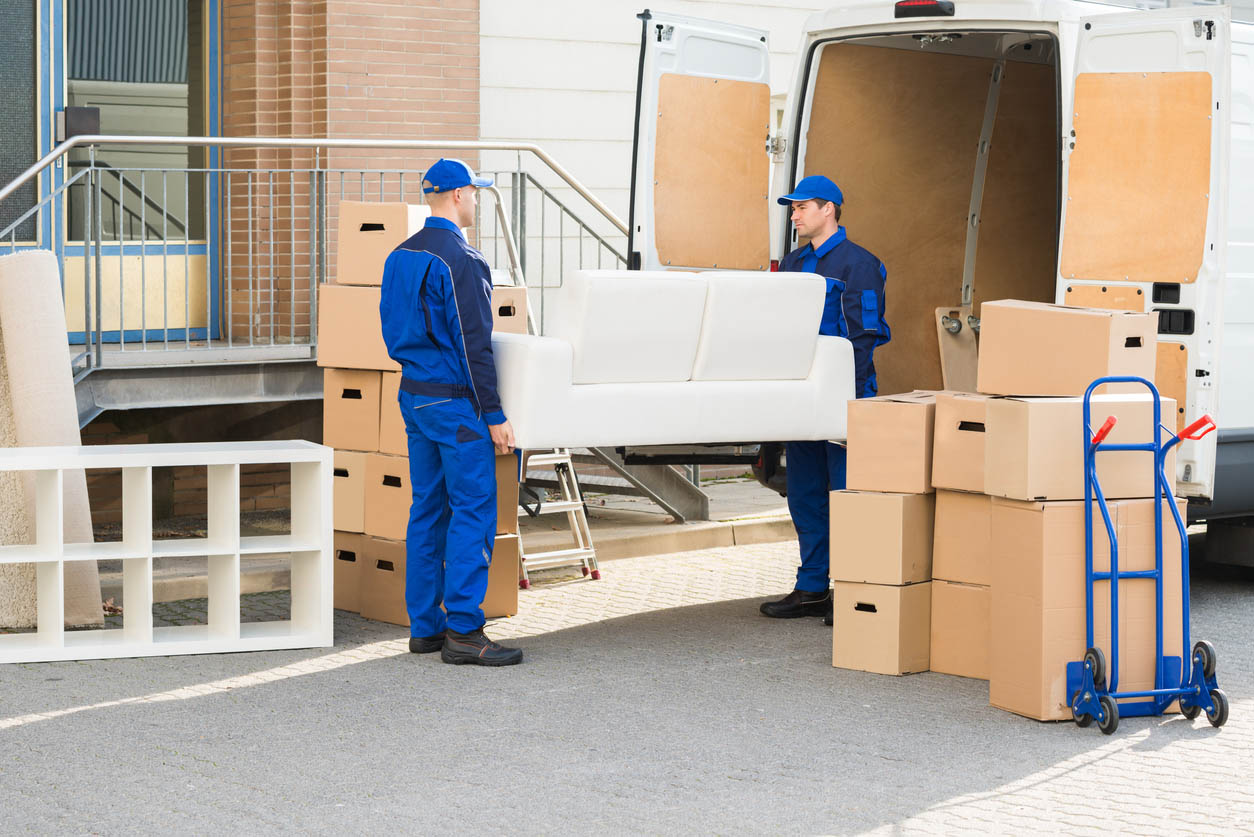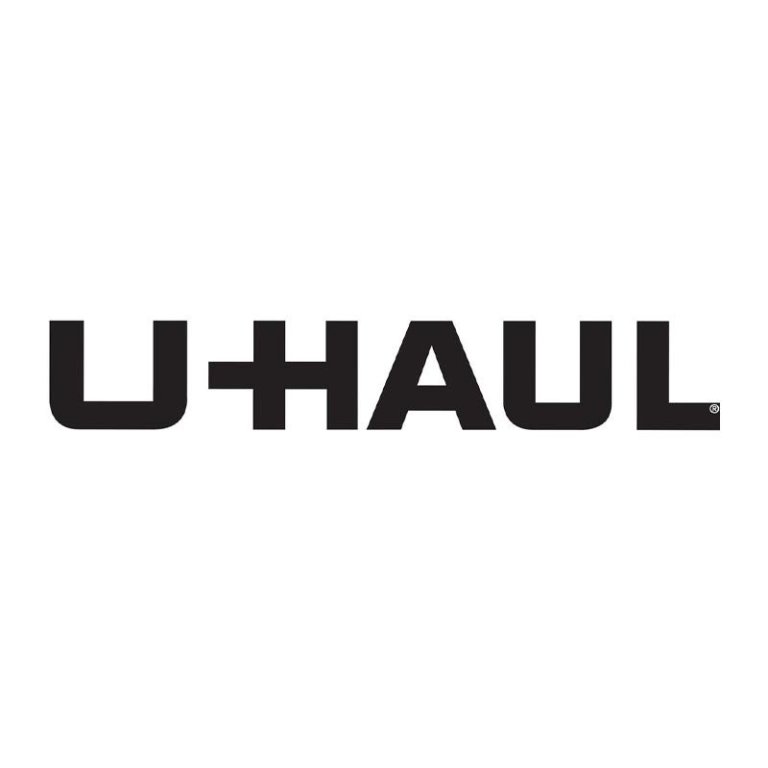
We may earn revenue from the products available on this page and participate in affiliate programs. Learn More ›
Moving to a new home can be stressful. No matter the move distance, there’s a fair amount of stress and hassle that comes with packing up, hauling, and unpacking belongings. And while many people have great friends and family members who can help with local moves (if they’re comfortable asking), moving can be easier with the help of one of the best moving companies. It’s helpful for someone who is moving to a new home to let professional movers take on the big job of transporting items using their labor, equipment, and trucks. Or, if a homeowner prefers to DIY the move, they can still use the assistance of trucks and containers built to sustain a move.
Choosing the best moving company can feel daunting for customers since they’re often entrusting their money—and valuables—to strangers. But there are plenty of ways for customers to ensure they choose the right company at the right price. The distance of the move will be a key factor in choosing a moving company, since a 50- to 100-mile move is typically considered local, though customers may need to call and ask about each company’s specific policy if it’s not explicitly stated on the website. Transporting goods across state lines, even within the local radius, might require a different company that is licensed to haul goods to different states. Beyond that, customers will want to consider factors like specialty items, timing, deposits, insurance, and more. The best moving companies are equipped to handle all types of moves and have great customer service and realistic pricing.
- BEST OVERALL: United Van Lines
- RUNNER-UP: International Van Lines
- BEST BANG FOR THE BUCK: American Van Lines
- BEST MOVING PACKAGES: Mayflower Transit
- BEST MOVING CONTAINER: PODS
- BEST MOVING TRUCK RENTAL: U-Haul
- ALSO CONSIDER: U-Pack

What to Consider When Choosing One of the Best Moving Companies
Moving a household is a complex process. As customers narrow down the specifics that apply to their situation, they can quickly identify a residential moving company for them. Whether a customer is looking for a local moving company or an out-of-state moving company, the following considerations will help them choose the best moving company for their needs. Most of these factors are applicable to full-service moving companies, but some are still pertinent to self-service moving options.
Service Area
National moving companies can often help customers move from any part of the country to another, but movers can have gaps in their service area. It’s worth checking out a moving company’s service area up front, particularly for those who are planning to move across the country. Local movers will have a much more limited service area, but they may also be familiar with logistical concerns that are specific to particular areas—getting permission to reserve parking in front of a building located in the heart of a busy city, for instance. In those scenarios, local movers may be the best moving companies for small moves, given their knowledge of the area and the hurdles that customers will need to go through to set up a move. Customers looking to move abroad will want to keep in mind that not all companies offer moving services to destinations outside of the country, and even those that do may only help customers move to select international locations.
Local, Interstate, or International Moves
Moving within a 50- to 100-mile radius typically only requires the help of a local mover. Depending on the area, local companies might be able to move the customer fairly quickly, which is helpful if the move was unexpected or the customer’s original plan for help fell through. Those moving to a new state will need to find one of the best interstate moving companies. Federal regulations require that companies transporting goods across state lines be licensed to do so. Since local companies might not specialize in this kind of transport, customers moving to a new state may need to find a larger company that offers national moving services. Customers who are moving their own belongings won’t need to worry about obtaining such a license.
International moves are a much more complex process that involves extensive paperwork, brokerage or port fees, customs fees, and scheduling shipping or air freight. Moving goods internationally can take weeks to months due to scheduling and transit times. An international moving company is the best option since this is a special kind of move that requires the right licenses and connections to the most reputable companies.
Pricing Transparency
Pricing a move isn’t a cut-and-dried process. Moving the contents of a 1-bedroom apartment is much easier and less costly than moving the contents of a 4-bedroom house. The size, weight, quantity, and type of items the customer has will influence the total cost. However, there should be transparency about the pricing once the customer has discussed what they’re planning to move and where. Any extras like auto transport or navigating stairs should have a fixed price that’s discussed ahead of time. While it’s not impossible for a fee to be added at the time of the move, it should be clear and fair. For instance, if the customer forgets to mention there is no elevator at their 3-story apartment complex, they’ll likely be charged a fee for the extra labor to use the stairs when the movers arrive.
Also, it’s best for customers to avoid going with the rate that is much cheaper than everyone else’s rates. That’s a red flag that the company could be running a scam to move the customer’s goods to a storage unit and charge them again to remove the items. Obtaining multiple quotes and going with the most reputable company is a customer’s safest bet to avoid being scammed.
License and Insurance
Customers will want to always book with a company that can show their license and insurance papers. Every full-service moving company should carry basic liability insurance and workers’ compensation insurance for their employees. Without these, the customer will have no legal recourse should the worst happen. Beyond basic liability insurance, it’s also helpful if a moving company offers the customer full-service insurance to insure their valuables at a higher rate if they own expensive items. If the company doesn’t offer this, the customer can always ask their own insurance company about moving insurance.
Interstate movers must be registered with the U.S. Department of Transportation. Customers can search their DOT number in the Federal Motor Carrier Safety Administration database. The American Trucking Association also has a comprehensive list of the best long-distance moving companies customers can review.
Auto Transportation
Many homeowners have more than one car, but they don’t always have a driver for every car. In this case, the customer will want to look for a moving company that can do auto transportation. Many of the bigger moving companies offer household moving and auto transportation, or the customer can search for a company that specializes in moving cars. If the car is exotic or antique, customers will want to ask about covered transport to keep it protected from the elements during the move.
Specialty Item Moving
Customers who own a piano, an antique grandfather clock, or other unusual, valuable, oversize, or delicate items will require specialty moving. If the customer is using a local moving company, they won’t want to just assume the company knows how to lift a piano into a moving truck. It’s not just about the weight; it’s about keeping the piano steady to avoid irreparably damaging the instrument. Using a piano moving company for any piano move is a critical option to prevent catastrophe.
For other items that are large, odd sizes (such as oversize flat-screen TVs) or have intrinsic value, customers will also want to make sure the movers are capable of properly packing the items and securing them in a way that they will not be damaged during transport. Other examples to consider are things like jet skis, hot tubs, or safes. All specialty items typically cost more to move since they require more packing material, equipment, care, or space, increasing the potential packers and movers cost.
Cancellation Policy
Customers will want to ask each company for their cancellation policy when they call for a customized quote or book online. It’s a good idea for the customer to know how close to the expected move date they can cancel if necessary, and how much money they’ll get back on their deposit. Unexpected things happen, so it’s best for customers to be aware of their policy and choose the company that offers a lot of flexibility if possible. Customers will also need to ask about the company’s side of the cancellation policy. Professional moving companies likely have a clause about the circumstances under which customers can cancel or change a move (it’s rare but can happen).
Deposit
Moving company deposits have a tendency to feel like the precursor to a scam—and for good reason. Deposits are one way that disreputable companies have been known to swindle people, but even reputable companies often require deposits. It’s not illegal, nor should it prevent a customer from hiring a moving company. A small deposit is basically held to secure the moving dates, as the company schedules its movers and trucks around each move. If the customer backs out of the move, a portion of that deposit offsets the company’s lost earnings on the canceled move.
The key to knowing whether a deposit is a red flag or not is the deposit amount. Good moving companies limit the required deposit to a relatively small amount—and in some cases, the best-rated moving companies won’t require a deposit at all. If a homeowner has a multi-thousand-dollar move coming up, their deposit should be around 20 percent. Large deposits or full deposits are a red flag.
Reviews and Complaints
Moving company reviews and complaints are a customer’s most valuable research tool when researching the best moving companies. Great reviews will share details about up-front pricing, ease of booking, safe handling of valuables, great customer service, etc. Some reviews for moving companies will complain about lost deposits, making it sound like the money was stolen, but it’s possible those customers were simply unhappy that they missed the cancellation window. While there are plenty of negative reviews for just about everything (that should be taken with a grain of salt), a company with a repeated history of unethical business practices should be avoided at all costs.
Customers will want to look at reviews on more than one website to get a well-rounded picture of the company—good and bad. No company is perfect, but many try their best. If the customer knows someone who recently used a moving company, they can also ask them about their experience. References are a great way to find a reliable moving company. It’s also wise to look up whether a company has had any official complaints lodged through the Federal Motor Carrier Safety Administration.
At-a-Glance Comparison
| Service Area | Type of Move | Customer Support | Auto Transport | Free Cancellation | Deposit Required | |
| United Van Lines | 50 states and Washington, D.C., international | Local, long-distance, international | Phone, email, live chat | Yes | Yes | No |
| International Van Lines | 50 states and Washington, D.C., international | Local, long-distance, international | Phone, email, live chat | Yes | Up to 48 hours before the move | 25 percent of quoted price |
| American Van Lines | 48 states and Washington, D.C., international | Local, long-distance | Phone, email | Unknown | Up to 7 days before the move | 10 to 50 percent of quoted price |
| Mayflower Transit | 50 states and Washington, D.C. (local agents available in 45 states), international | Local, long-distance, international | Phone, email, live chat | Yes | Up to 24 hours before the move | No |
| PODS | 46 states and Washington, D.C., international | Local, long-distance, international to United Kingdom and Australia | Phone, email | Through third party | By 4 p.m. local time up to 3 days before container drop-off | Varies by service |
| U-Haul | 50 states, international | Local, long-distance, international | Phone, email, live chat | Vehicle towing equipment available | Up to 24 hours before reservation | None for credit card payments |
| U-Pack | 50 states and Washington, D.C., Canada | Long-distance only | Phone, email, Facebook Messenger | No | Up to 7 days before the move | No |
Our Top Picks
A customer’s decision on which company to choose for tackling a move can be daunting. Choosing the right company builds the customer’s confidence and ensures a smooth transaction. These are our recommended moving companies that can serve customers across the country.
Best Overall
United Van Lines
Pros
- Nationwide availability with 500 locations in 50 states and Washington, D.C.
- Custom crating available for specialty and fragile items
- Free cancellation as long as no services have been provided
- Discounts for small long-distance moving jobs for studio apartments or tiny homes
- Convenient appointment booking, tracking, and management via MyUnited online portal
Cons
- Somewhat challenging customer service experience
Specs
- Service area: 50 states and Washington, D.C., international
- Type of move: Local, long-distance, international
- Customer support: Phone, email, live chat
- Auto transport: Yes
- Free cancellation: Yes
- Deposit required: No
Why It Made the Cut: United Van Lines has a nationwide presence and can handle any moving distance—plus, the convenient online portal allows customers to access details about their move and contract at any time for additional peace of mind.
United Van Lines boasts 500 locations in all 50 U.S. states and Washington, D.C., making it an option for customers regardless of their location. The company offers local, long-distance, and international moves, as well as free cancellation as long as no services have been provided. Customers may find it challenging to get in touch with customer support, and the quote process requires a physical visit from an estimator, which may be off-putting for some customers. However, the company offers convenient appointment booking, tracking, and management via the MyUnited online portal, making it easier for customers to stay informed about the progress of their move without needing to directly contact a company representative.
Customers with specialty or fragile items to move will appreciate the custom crating option provided by United Van Lines. Custom crating helps protect these fragile items from breaking during the move, giving customers peace of mind that their belongings are safe. Finally, United Van Lines offers discounts for small moving jobs involving studio apartments or tiny houses, which can help customers save money on their move.
- Learn more with our United Van Lines review.
Runner-Up
International Van Lines
Pros
- Services available in over 140 foreign destinations
- Pricing and fee breakdown readily available
- Discounts available for customers with flexible moving dates
Cons
- Somewhat user-unfriendly online inventory system
- Somewhat large 25 percent deposit required at booking
Specs
- Service area: 50 states and Washington, D.C., international
- Type of move: Local, long-distance, international
- Customer support: Phone, email, live chat
- Auto transport: Yes
- Free cancellation: Up to 48 hours before the move
- Deposit required: 25 percent of quoted price
Why It Made the Cut: International Van Lines boasts a generous cancellation policy and impressive discounts for customers with flexible moving dates—and the company provides moving services to more than 140 destinations around the world.
International Van Lines has branches across the country, as well as some locations overseas. Customers moving internationally will appreciate the fact that International Van Lines can facilitate moves to more than 140 destinations across the globe, making the company a solid choice for those moving out of the country. Customers may find that the online inventory system is a little difficult to navigate; the system requires users to scroll through a long list of items to find the specific items they want to include in their move, which can be cumbersome. However, the system has several unusual items listed, such as surfboards, so it’s almost guaranteed that customers will find their items listed in the inventory system.
International Van Lines offers moving discounts of 10 percent to 15 percent for customers who have flexible dates, which can help lower the cost of moving for those who aren’t tied to a specific moving date. The company requires customers to put down a 25 percent deposit to reserve their moving date, which can be a significant up-front payment. However, that requirement is balanced out by International Van Lines’ relatively flexible cancellation policy. Customers who cancel 48 hours or more before their scheduled move will have their deposit fully refunded. International Van Lines also makes it easy for customers to estimate their moving costs, thanks to the online resources that break down the various fees and pricing factors that can affect the cost of a move. In all, International Van Lines is a good choice for a wide variety of moving customers.
Best Bang for the Buck
American Van Lines
Pros
- Discounted prices for moves between major cities
- Fixed-rate pricing system for all services
- Sustainability initiatives that aim to reduce the environmental impact of moving
Cons
- Large deposit of up to 50 percent required
- Cancellation limited to 7 days before the move
Specs
- Service area: 48 states and Washington, D.C.
- Type of move: Local, long-distance
- Customer support: Phone, email
- Auto transport: Unknown
- Free cancellation: Up to 7 days before the move
- Deposit required: Up to 50 percent of quoted price
Why It Made the Cut: American Van Lines is considered one of the best cheap moving services thanks to its flat-rate service fees and discounts for customers moving between major U.S. cities.
American Van Lines provides local and long-distance moving services for customers in the lower 48 states and Washington, D.C. As an added benefit, the company offers discounted prices for customers who are moving between major cities and opt to use weekly shuttles that move multiple customers at one time. This can be especially beneficial for those on a tight budget for their move. In order to offer such transparent pricing, American Van Lines has a relatively strict cancellation policy that’s limited to 7 days or more before a move. Customers who need to cancel their move at the last minute may end up losing their deposit (which can be as much as 50 percent of the total move cost). However, American Van Lines makes it easy for customers to estimate their moving costs thanks to the company’s flat-rate pricing system, which also helps them save on the cost of additional services such as furniture disassembly and reassembly. Therefore, customers who are certain their move date will not change can see substantial savings by going with American Van Lines.
In addition to budget-friendly pricing, American Van Lines has several sustainability initiatives designed to reduce the environmental impact of moving. These include the use of fuel-efficient vehicles, the establishment of recycling initiatives, and contributions to environmental nonprofits. These initiatives can help eco-conscious customers feel better about the impact of their move on the environment.
Best Moving Packages
Mayflower Transit
Pros
- Customizable long-distance moving service bundles available
- Convenient appointment booking, tracking, and management via MyMayflower online portal
- Unwanted food donated to local food banks
Cons
- Moving supplies purchased separately
Specs
- Service area: 50 states and Washington, D.C. (local agents available in 45 states), international
- Type of move: Local, long-distance, international
- Customer support: Phone, email, live chat
- Auto transport: Yes
- Free cancellation: Up to 24 hours before the move
- Deposit required: No
Why It Made the Cut: Mayflower Transit specializes in customizing moving packages to meet customers’ specific moving needs domestically and internationally.
Mayflower Transit offers a range of moving packages to suit a variety of customers, from those looking for a traditional local or long-distance moving service to those relocating for military or government positions. This specialization makes Mayflower Transit one of the best military moving companies. Moving packages are also customizable, giving customers the ability to add storage, packing and unpacking, and debris removal services—though customers must purchase moving supplies separately. Mayflower assigns a personal move coordinator to each move, so customers have a single point of contact to manage their move and address any concerns rather than needing to explain their situation to multiple company representatives. It’s also helpful that Mayflower does not require a deposit up front and allows cancellations up to 24 hours prior to the move.
Users can access checklists, mover contracts, and tracking information within the MyMayflower online portal, which makes it easier for them to stay on top of their move. And as an added bonus, the company’s partnership with the nonprofit organization Move for Hunger means nonperishable food items will be donated to a local food bank or pantry, so the customer doesn’t have to pay to move it and can feel good about helping an important cause.
- Learn more with our Mayflower Transit review.
Best Moving Container
PODS
Pros
- Wide container size range with 3 options of 8, 12, and 16 feet
- Relatively low 2 percent damage rate
- Flexible content protection plans ranging from $5,000 to $300,000 in value
- Specialized services for city dwellers
Cons
- Prices may be relatively high
- Storage container placement may be limited by local regulations
Specs
- Service area: 46 states and Washington, D.C., international
- Type of move: Local, long-distance, international to United Kingdom and Australia
- Customer support: Phone, email
- Auto transport: Through third party
- Free cancellation: By 4 p.m. local time up to 3 days before container drop-off
- Deposit required: Varies by service
Why It Made the Cut: PODS is one of the best moving container companies for good reason—the company offers multiple container sizes, flexible content protection plans, and a specialty service designed with city dwellers in mind.
Customers who want to DIY part of their move may want to add PODS to their list of moving companies to consider. The company delivers a moving container to the customer’s home and gives them the time they need to load their belongings. Once the container is loaded, PODS picks it up and moves it to the customer’s new location, where they can unpack it at their own leisure. But PODS offers much more than just moving containers. To start, the company has an excellent track record for handling customer belongings with a less than 2 percent damage rate—well below the 20 percent industry average claimed on the company’s website. Additionally, the company’s flexible protection plans range from $5,000 to $300,000 in value, which gives customers the opportunity to protect their belongings for their full value without paying extra for coverage they don’t need. Customers may find PODS moving costs to be relatively high, though the exact pricing will depend on a number of factors. For this reason, customers will want to request a quote to get the most accurate price for their move.
PODS offers containers in three different sizes (8 feet, 12 feet, and 16 feet) to suit moves of different sizes. Customers will want to note that their local municipality may have restrictions on the placement of moving containers—especially if they do not have a private driveway—so they’ll want to familiarize themselves with potential restrictions before booking a PODS container. To get around potential restrictions, PODS has a special service for city dwellers called PODS City Service, where the container remains on the truck outside the customer’s home while it’s loaded. The PODS driver will then stay with the container while the customer loads it to protect against thieves and parking enforcement officers. This can help customers living in cities navigate the logistical challenges of moving to or from a densely populated area.
Best Moving Truck Rental
U-Haul
Pros
- More than 23,000 rental locations nationwide
- Convenient self-service truck rentals available
-
Relatively affordable cost for moves under 100 miles
Cons
- Per-mile payment structure may not be cost-effective for moves over 100 miles
- Vehicle options may be limited for some moves
Specs
- Service area: 50 states and Washington, D.C., international
- Type of move: Local, long-distance
- Customer support: Phone, email, live chat
- Auto transport: Vehicle towing equipment available
- Free cancellation: Up to 24 hours before reservation
- Deposit required: None for credit card payments
Why It Made the Cut: U-Haul is a well-known truck rental company with thousands of locations nationwide, a convenient booking app, and relatively affordable rates. All of these factors come together to make it one of the best moving truck companies.
U-Haul has been in business for more than 75 years and boasts some 23,000 locations nationwide, making it one of the largest and best-established truck rental companies in the country. The company makes it easy for customers to book moving truck rentals through the Truck Share 24/7 service platform; customers can also use the platform to pick up or drop off a truck even when the physical location is closed. This platform, which can be accessed via mobile device, can also be used for customers to upload documents such as photos of their driver’s license, retrieve codes to unlock key kiosks, and document vehicle condition and fuel levels.
Customers who rent a U-Haul truck for a one-way trip, such as a move, will have a mileage allowance—but anything over that amount will be charged on a per-mile basis, which could make costs add up quickly if they take too many detours. For that reason, customers moving a long distance may find U-Haul to be a pricey option in some situations. However, customers moving locally will likely not find this to be an issue. In general, U-Haul is a very affordable choice for customers who are moving 100 miles or less.
U-Haul boasts a large selection of trucks, including cargo vans, 10-foot trucks, 15-foot trucks, 20-foot trucks, and 26-foot trucks. This selection means customers will likely find the right size of truck they need for their move. However, customers may find that, depending on local availability, the size of truck they need is not available for their move dates. But customers who do find the truck they need will appreciate the smooth and easy driving experience thanks to U-Haul’s Gentle-Ride suspension. Customers will also be glad to know that U-Haul doesn’t require a deposit for customers provided they pay by credit card. Regardless of what payment option a customer chooses, they can cancel for free up to 24 hours before their appointment. U-Haul also offers gas-efficient cargo vans that get up to 18 miles per gallon (mpg) and are great for smaller moves.
Also Consider
U-Pack
Pros
- Lengthy 3-day period to load and unload belongings
- Moving staffers for packing and unpacking available for hire
- Instant online quote available upon request
Cons
- Moves less than 150 miles away from starting location may not be facilitated
- Cancellation limited to 7 days before the move
Specs
- Service area: 50 states and Washington, D.C., Canada
- Type of move: Long-distance only
- Customer support: Phone, email, Facebook Messenger
- Auto transport: No
- Free cancellation: Up to 7 days before the move
- Deposit required: No
Why It Made the Cut: U-Pack is a flexible option for customers who prefer to do the packing and unpacking themselves while leaving the long-haul transport to a pro.
U-Pack is a nationwide moving company that brings a trailer or container to the customer’s house for them to load, and then drives it to their new home. One of U-Pack’s biggest advantages is the 3-day period it gives customers to load and unload their belongings; this gives customers plenty of time to pack and not feel like they have to rush. U-Pack only caters to long-distance moves of 150 miles or more, so customers moving a shorter distance will need to look elsewhere for their moving needs. However, U-Pack does not require a deposit and offers free cancellation, though only up to 7 days before the move.
Customers who prefer to leave packing and unpacking to the pros can also hire professional third-party movers through U-Pack. The hiring is coordinated by U-Pack moving staffers, and customers will only need to pay one bill rather than two separate bills for their moving services. Customers can get an instant online quote from U-Pack, allowing them to easily shop around and compare rates before deciding on the best company for their upcoming move.
Our Verdict
Great customer support, transparent pricing, adequately covered territory, special services, and a reliable reputation are the key components of the best moving companies. That’s why we selected United Van Lines as our top choice since it has a large service area, plenty of options, a helpful customer portal, and doesn’t require a deposit. For customers looking to save money on their move, American Van Lines offers several options to help them do so.
How We Chose the Best Moving Companies
While much depends on the location and distance of the move and the quantity and type of goods the customer needs to move, there are a few elements that stood out to us when reviewing the top-rated moving services. We evaluated companies that have local, statewide, nationwide, and international moving options to provide the coverage needed for any homeowner or renter. We also looked for self-service moving truck and container options for customers who prefer to handle a move themselves. We evaluated the websites of each company and took the overall customer reviews and experiences into account to make sure most customers enjoyed a satisfactory or pleasant experience. We also reviewed factors such as cancellation policies and deposits, as well as the ability to track and monitor shipments. All the companies on our list are nationally known and have been in business for several years with an overall reliable reputation.
Before You Hire One of the Best Moving Companies
Before hiring a full-service moving company, customers will need to consider whether they’re moving locally, within the state, across state lines, or even internationally. Some companies cannot offer some moving services if they aren’t licensed to transport across state lines. Local companies are great for local moves as long as they have a solid reputation, but customers will likely need to find a national moving company they trust to move greater distances.
Most importantly, hiring one of the top-rated moving companies is vital for those who are willing to entrust their goods to other people. Professional movers offer a helpful service that can help people who are unable to pack, carry, and transport their items, but it does come at a price customers need to be willing to pay. Customers will want to make sure they choose a company that is licensed and qualified to handle their specific needs whether it’s extra services or distance. They’ll also want to ask movers lots of questions, get written estimates so they can compare details, and always do their research to evaluate reviews from several sources.
Customers will also want to consider any additional services they require, such as auto transportation, specialized packing, or junk removal services. Weighing these considerations can help narrow down their options so they can directly compare moving companies that best meet their needs. For instance, someone interested in container storage solutions may decide to limit their search to companies that focus on these types of services, comparing PODS vs. U-Haul to determine the best option for them. Alternatively, they might want to compare the pros and cons of using a moving container vs. renting a truck to complete their move themselves.
Cost of Hiring One of the Best Moving Companies
The cost to move is a moving target since no two moves are the same, and the costs for professional movers will be more than DIY or self-service moves. For moves of less than 100 miles, the average cost is $1,710 with a range of $920 to $2,530, but moving out of state could cost $2,700 to $10,000. Comparatively, the cost to rent a moving truck is around $1,200 to $2,100 in total, but the customer is responsible for the labor.
Many of the top moving companies offer an online estimate or calculator that can help estimate the cost, but customers of full-service moving companies may also need to do a walk-through in person or virtually to have the most accurate assessment and avoid unexpected costs.
Full-service moving services calculate costs based on weight, but that’s determined by the size, volume, and type of items being moved. There are basic average estimates for the number of rooms being moved that can be used initially, but any specialty items like pianos, cars, safes, hot tubs, etc., will require extra consideration and cost. Additionally, the distance the customer is moving will affect the total price since they’ll be charged for the driver’s time, fuel, and mileage.
Customers can expect to pay $25 to $50 per hour per mover, and the amount of belongings will determine how many employees the company will send to the house. For instance, a small apartment usually needs two employees who work for 2 to 3 hours. Additionally, customers might be charged extra if access is difficult, there are numerous stairs, or they have lots of heavy items. Moving in the summer or on weekends or holidays is always more expensive and can be hard to schedule, so customers will want to opt to move in the middle of the week if possible.
The Advantages of Using One of the Best Moving Companies
Moving is a hassle, even though relocating to a new city can be an adventure. Relieving the stress and strain of moving are popular reasons for using a moving company, even though it can feel like an expensive venture. But the benefits of using the best moving services help offset the costs.
- Relieves stress. Worrying about loading, transporting, and unloading items within a short period is stressful, so leaving that to the pros can reduce unnecessary and unhealthy stress.
- Avoids injury. The customer might already have a bad back, cause a hernia, smash fingers, or worse if a serious accident happens while moving heavy, unwieldy furniture.
- Saves time. If the customer doesn’t have time to pack up and move, they can hand over the entire job to a full-service moving company.
- Keeps belongings secure. Sometimes people have a period of time between moving out of one home and into a new one. In this case, the moving company or a moving container company can safely store the customer’s goods until they’re ready to be moved in.
- Insures your valuables. If someone accidentally breaks a priceless heirloom during a DIY move, the owner might not have any recourse if it wasn’t insured. However, moving companies must have liability insurance and often offer full coverage for an extra fee, meaning any broken items will likely be covered.
- Proper packing. Professional movers are adept at carefully packing and securing belongings, both small and large. They can carefully load the trailer in a way that will keep all the goods secure for a long move for more peace of mind, whereas that might not be as natural and easy for the person moving.
FAQs
While the information above puts customers in a good position to start getting quotes from moving companies, they may still have lingering questions that they want answered before moving forward. Answering some of the most commonly asked questions about hiring a moving company can help guide the decision-making process so customers pick reliable movers who are able to take on their move without any issues.
There’s no set rate that moving companies charge for a move. Moving costs are made up of several factors like distance, time, weight, and type of items. Local movers might charge a flat rate based on the number of rooms being moved, but long-distance moves typically need customized quotes that may include fixed-rate fees. Customers can get initial estimates online from many major moving companies, but it’s advisable for them to talk to someone about their needs to get an accurate quote. On average, local moves of 100 miles or less cost about $1,710, but long-distance moves can cost up to $10,000.
Tipping is not required, but it’s considered polite. Yes, the moving company is already charging the customer to do the job, but in reality, the movers are doing them a huge favor and potentially saving them from injury, too. Offering movers a tip is a way for the customer to express their gratitude for their manual labor, especially if they do a great job, show up on time, are friendly, and handle the items with care. If customers are happy with the service and able to tip, it’s a good idea to estimate 10 to 20 percent of the total cost.
It depends on what the customer is hiring them to do. If the movers are only being paid to load, haul, and unload the customer’s belongings, then they won’t be doing any packing, which means they won’t provide boxes. If the customer is hiring them to pack their items or do a full-service move, then the cost of all boxes, tape, bubble wrap, etc., will be included in the price.
Some moving companies do offer boxes for purchase if needed, and many will also bring some moving supplies in case the customer’s items aren’t properly secured. Customers will be charged for whatever the movers use that was not in the original contract, such as moving blankets for a TV or furniture bags or protective sheets.
Some moving companies offer this as an extra service if customers ask ahead of time. They usually charge the same hourly labor rate as for moving. Disassembling and assembling furniture can be extremely helpful for customers to add on to their moving costs if they have children or if the task is beyond their physical capacity. If the moving company does not offer this service, a customer can hire one of the best furniture assembly services.
Sources: HomeAdvisor, MoveBuddha, You Move Me










